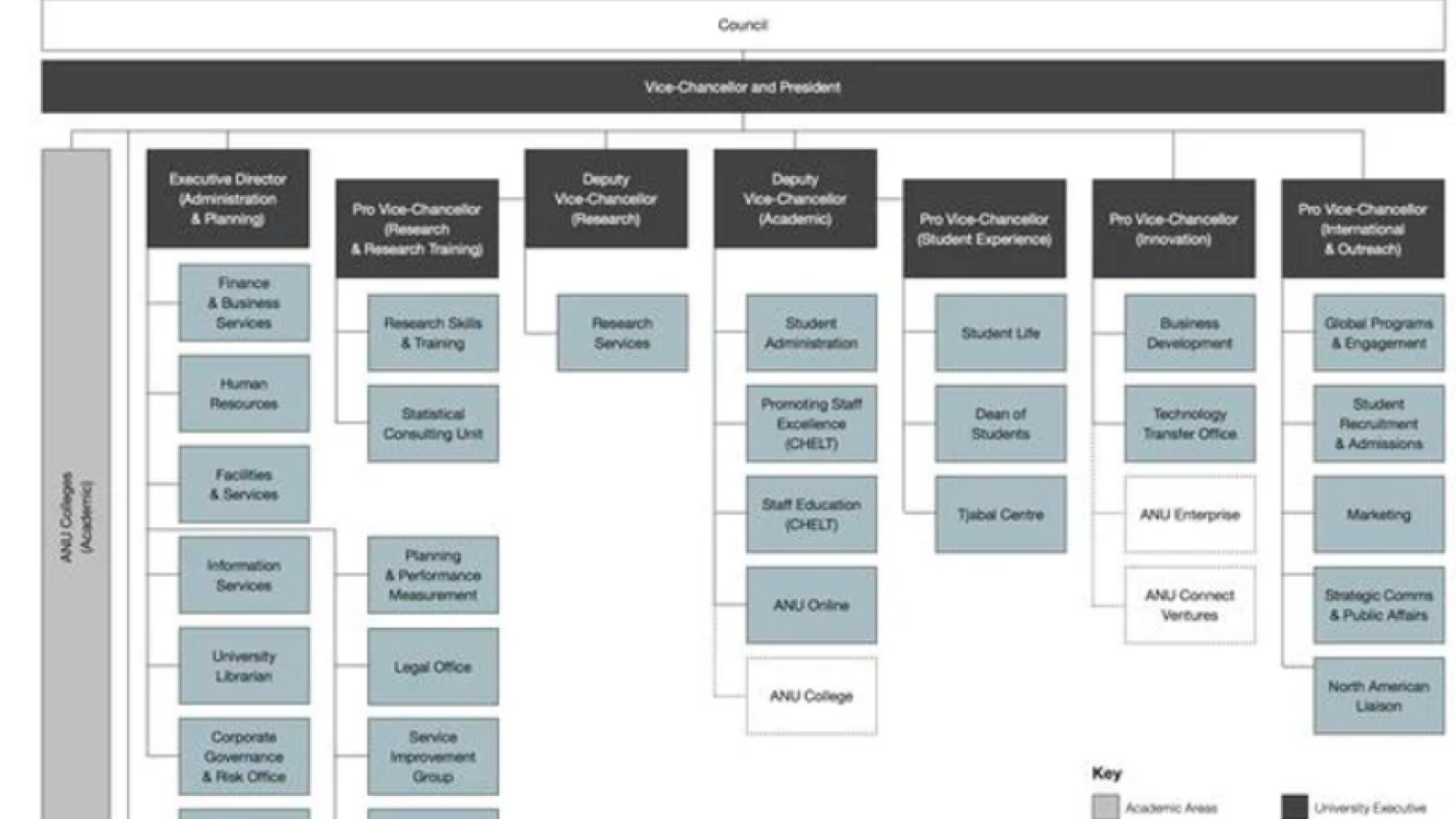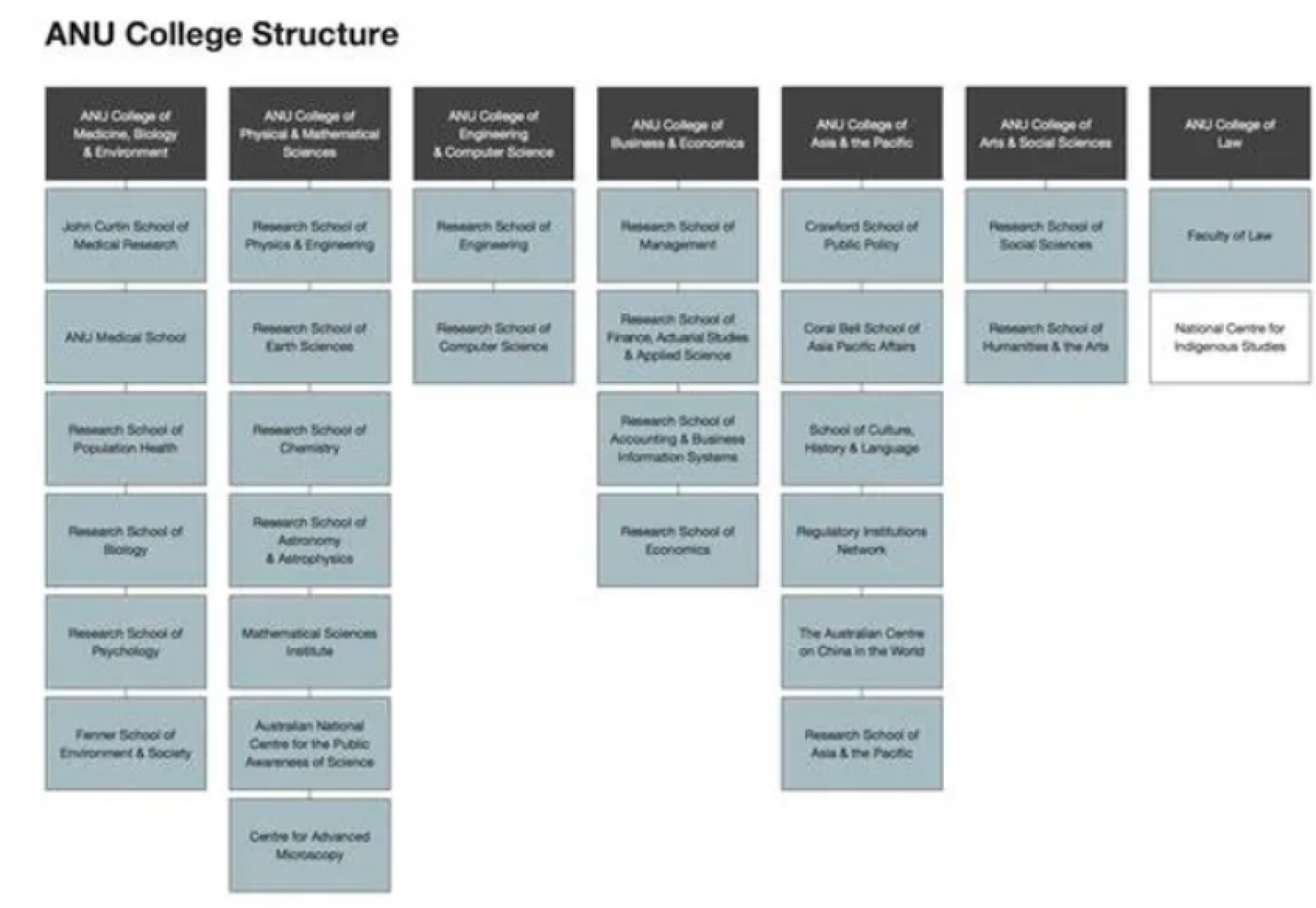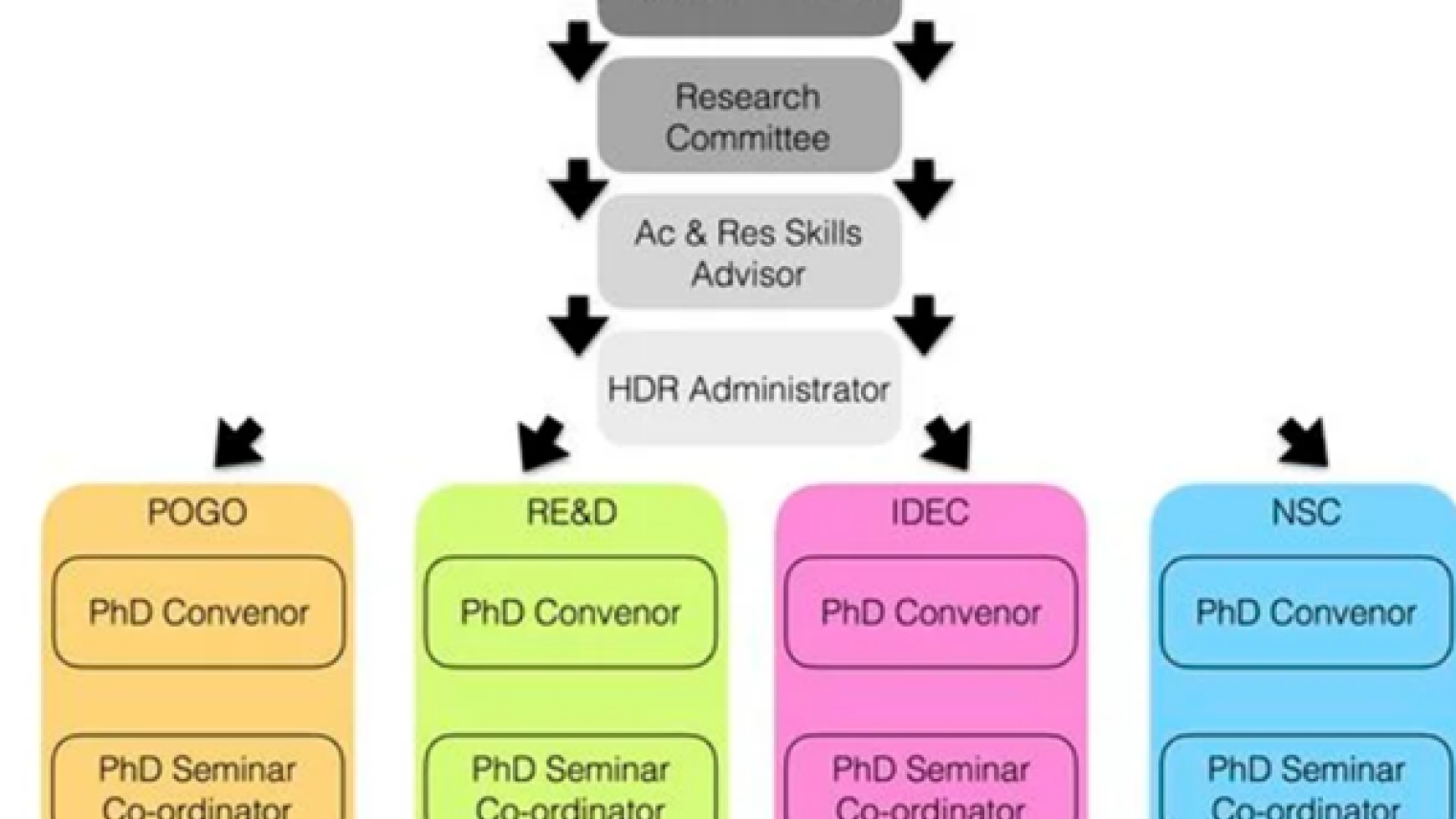ANU structure
Here it is, in all its glory, below. What will affect you most is the grey bit down the left-hand side that says 'ANU Colleges'. The Crawford School of Public Policy is part of the ANU College of Asia and the Pacific (CAP), which is why you’ll often hear people referring to 'CAP', and why you will often be directed to areas such as 'CAP Admin' or 'CAP Facilities'.


Crawford PhD organisational chart
It kind of works like this, except there’s also an HDR Administrator for the Arndt-Corden Department of Economics — so if you’re in ACDE, then contact the ACDE Administrator. The chart just shows some general relationships; it does not show reporting lines because we’re all equal here, innit.

Manage my degree (MMD) eForms
Most of the approvals you need can be submitted via Manage My Degree (HDR) eForms. eForms sits within ISIS and supports an integrated approvals and reporting process, meaning that when you submit something, it goes to the right person for approval.
You must have your Chair of Panel and Primary Supervisor (this might be the same person, see Supervision and your panel) listed in ISIS in order for your eForms to find their way to the correct person. Without the panel members listed, your eForm application will not be processed and the application will just sit in limbo until the panel information is updated. If you do not have a Chair of Panel or Primary Supervisor listed you must let the HDR Administrator know so that they can update your supervisory panel information in the student system so that it appears in ISIS.
Any request dated from 'today' onwards can be processed via eForms and can be submitted 3 months in advance, no more. If you are making a 'retrospective' application or request, e.g., you want to apply for leave that you have already taken, or you want to backdate something, then you will have to fill out a paper form, in which case you should contact the HDR Administrator.
The following functions are included in MMD eForms:
-
Apply for leave
-
Change enrolment (add or drop coursework courses)
-
Apply for extension of program
-
Apply for extension of scholarship
-
Change of intensity (full or part time)
-
Voluntary discontinuation or program withdrawal
-
Apply for extension of eCOE (electronic confirmation of enrolment)
See below for information relating to specific eForms.
Delegated authority (DA)
Either the School Director, School Manager, or the Research Director acts as the Delegated Authority (DA) for PhD matters. The Delegated Authority is ultimately responsible for most day-to-day aspects of your research program and the DA’s endorsement is required for all processes affecting your progress. This responsibility is sometimes delegated to one of the Deputy Directors in a DA’s absence.
Workload
As a full-time research student you are expected to devote 40 hours a week on average (pro-rata for part-time students) to your research program, with the exception of four weeks’ annual recreation leave, which is agreed to and approved by the Chair of the supervisory panel. See the ANU’s Procedure: Higher degree by research – candidature for more information.
Attendance and absences
The minimum attendance requirement at the University is 18 months for full-time and 24 months for part-time candidates at the ANU, unless you have approved external status, in which case the minimum attendance requirement is four weeks. For information on PhD attendance requirements, including those for part-timers, see the ANU’s Procedure: Higher degree by research – candidature. In any event, it is actually good for you to come into campus every so often, just to keep in touch with the PhD community and to let us know how you are going. So, don’t be a stranger!
You must advise of any likely absence while you are on-course: this includes your annual (aka ‘recreation’) leave entitlement of four weeks, and fieldwork and conference attendance. Any program and scholarship leave must be formally approved and an application should be submitted well in advance of the date at which leave is envisaged to commence. Any absence requests must be submitted in a timely manner.
If you are an external student, you must attend the university campus for a minimum of 4 weeks per year if you are full-time, or 2 weeks if you are part-time. Once you arrive (not before) you must email hdr.administration@anu.edu.au and advise them of the date you arrived and the date that you will be leaving. This is then recorded on your file.
Candidates should be aware that unapproved absences could result in their being in breach of the conditions of admission or scholarship award or, for international students, their visa conditions.
Fieldwork
Some students will need to undertake fieldwork as an integral part of their research. Your supervisor, in consultation with you, will make judgments on the necessity for fieldwork and on its scope. Fieldwork refers to the collection of primary data for the purpose of meeting a specific research goal and that is directly used in the final presentation of the research (i.e., the thesis). Examples of fieldwork include undertaking participant observation, conducting interviews and focus groups, and undertaking surveys or similar data collection methods that require direct engagement with participants. Experiments are not counted as fieldwork as they are typically conducted in a controlled environment. The collection of secondary data and attendance at meetings and similar are also not defined as fieldwork as they do not involve the collection of primary data that will be used in the final presentation of the research.
Students going on fieldwork must undertake the requisite fieldwork and risk management training required by ANU. All fieldwork students must do the basic work health and safety (WHS) and/or fieldwork safety courses (see the training catalogue) and, where necessary, First aid: remote area training (see below). You will not be permitted to go on fieldwork until you have completed the necessary training. If someone — including your supervisor — tells you that you do not need to do the training, they are wrong: you must do the training. You will not be able to apply for Crawford HDR student fieldwork funding until you have done the training. Did we mention that you need to do the training?
If you intend to go on fieldwork, you will need to
-
Follow the ANU’s procedure for working safely away from campus. It is important that people intending on going on fieldwork read and implement the ANU’s procedure for fieldwork health and off-campus work safety. You should be familiar with this procedure. In particular, you should pay attention to the discussion regarding hazards and risks likely to be encountered, and you should put in place appropriate measures or actions before you go on fieldwork. Our advice is that students and supervisors discuss these actions and measures between yourselves and make a record of that discussion.
-
Have the appropriate Ethics approvals.
-
Undertake the basic work health and safety (WHS) and fieldwork safety course. This approx 2-hour workshop is compulsory for all CAP HDR students participating in fieldwork or off-campus work for the first time as ANU staff or students. For details about upcoming dates and to register, view the training catalogue. Please note, though, if a course it not scheduled for the next couple of months, it will not be displayed there until the next class becomes available. It is important that you do your WHS and fieldwork training early; the courses are not run every week, so if you leave it to the last minute you may miss out on the opportunity to get into the field, as you will not be permitted on fieldwork until you have completed the training. Check the training catalogue. You may need a budget code as well as additional registration information, in which case you should email the PhD Academic and Research Skills Advisor for said code. If you cannot register, then email whstraining@anu.edu.au and let them know what course you want to attend. Once you have completed your training, go to your ‘View Training Summary’ tab in HORUS. You can take a screenshot or a print of this page.
-
Be trained in remote area first aid and have a remote area first aid certificate if you are conducting fieldwork in a remote area (see section 22 of the ANU’s procedure for working safely away from campus). You should therefore undertake the FAHR04 First aid: remote area course if you are conducting fieldwork in a remote* area (see the end of this section for a definition, as well as for some important notes). The remote area course is essentially the regular, two-day (sometimes referred to as ‘advanced’) first-aid course, with a third day tacked on to cover ‘remote’ first aid; this means it is a three-day course, and it is usually delivered over three weeks. We will not send you on this course unless you have passed your TPR or, if you have not yet cleared your TPR milestone, your supervisor approves your attendance (contact the PhD Academic and Research Skills Advisor for details). Check the training catalogue and enrol. You may need a budget code as well as additional registration information, in which case you should email the PhD Academic and Research Skills Advisor for said code. If you cannot register, then email whstraining@anu.edu.au and let them know what course you want to attend.
-
Complete the online Travel approval form in eForms at least two weeks prior to departure. If you are planning to visit a high risk destination, please advise the HDR Administrator. See Travel approval and the ANU’s Procedure: Travel to high risk destinations for more information.
-
Go over the Elements for consideration in fieldwork and off-campus work and determine how they affect you.
-
Complete a fieldwork plan (there is no template for this — you can make up your own schedule) and register it with the HDR Administrator. Your application for fieldwork will need to be accompanied by a supporting statement from your supervisor and a budget statement before the HDR Director will approve your travel on fieldwork.
-
Advise the HDR Administrator if they are planning to visit a ‘high risk’ country.
The Crawford School may provide funding support moderate fieldwork costs if these are not already being supported from other sources. You must advise of any likely absence while you are on-course: this includes fieldwork. Any absence requests must be formally approved must be submitted in a timely manner.
IMPORTANT NOTES RELATING TO REMOTE AREA FIRST AID TRAINING
*Remote area: A location separated from an appropriately resourced urban centre by distance, terrain, access, time and/or available communication links. A remote area is on land or water. A remote area is not necessarily related to the distance from an urban centre. In the event of an emergency, assistance would be delayed, with the possibility of adverse outcomes. Remote areas can apply to off-campus work or fieldwork. The key here is that emergency response if or when needed would be significantly delayed.
-
On the definition of ‘remote’ as provided in the ANU’s Procedure: Fieldwork health and off-campus work safety, remote does not simply refer to population or population density; in particular, the procedure states, “A remote area is not necessarily related to the distance from an urban centre. In the event of an emergency, assistance would be delayed, with the possibility of adverse outcomes.” Thus, you might be going to populous and densly populated New Delhi, but the key criterion of ‘assistance would be delayed’ (because of potential slowness of emergency response) would require that the student undertake this training. Similarly, the existence of medical facilities does not impact on whether a place is deemed remote or not: the issue is the speed of emergency response.
-
It doesn’t matter how long a person has previously spent in a location or where they come from or what their networks are; rather, remote area first aid training is about skills. For example, I might come from or have lived for a long time in Ceduna in remote South Australia, or I might come from or have lived for a long time in Mexico City, but that does not guarantee that I can correctly apply first aid to a snake bite in the desert or know how to order a helicopter evacuation in a densly populated and crime-affected area.
-
Supervisors have a duty of care to their students, and if a catastrophic event were to occur (e.g., serious injury or death), then subsequent inquiry would likely seek to establish whether or not the supervisor reasonably acquitted that duty of care. For this reason, supervisors must make sure that students undertake the relevant training.
Conference attendance
You must advise of any likely absences while you are on-course: this includes attendance at conferences outside Canberra. Any absence requests must be formally approved must be submitted in a timely manner. You need to fill in the online Travel approval form if you want to attend a conference outside Canberra. This form will cover you for insurance purposes. That makes it important. See Travel approval, below, for more information.
Travel approval
When you travel for conferences, fieldwork, and so on, you need to complete an online ANU Approval to Travel form. This also acts as your travel insurance. Make sure you take your Chubb travel assistance card with you. If you have applied to Crawford for funding, you must wait until you have confirmation that the funding has been considered and approved by the HDR Committee before you submit a travel approval request online — otherwise, the travel request cannot be granted. If you have submitted but not yet received an approval for admission to the degree letter and you are travelling on university business, you should also still submit an approval form. You do not need travel approval for annual leave.
Once you are ready to submit your travel approval form, you will need the following information to complete the application:
-
Payment method: “Direct payment” must be selected. If “Advance payment” is ticked, funds received via advance payment will have to be repaid in full.
-
Domestic travel delegate: School manager (check Crawford website)
-
International travel delegate: School director (check Crawford website)
-
Your approved scholarship form or evidence of funding to the travel approval request
See also Travel Approval and E-Form on the ANU website
Travel insurance and assistance
ANU students are insured under ANU travel policy whilst on authorized and approved travel programs. Please note that depending on what you need, this travel policy may not be sufficient for you. Please read carefully all travel policy documents and information kit. For more information, visit the ANU's travel insurance information page.
Useful links
Travel insurance, including information about claims
How to use your Chubb Assistance Card (Note: if you need assistance or think you will need assistance, please inform Chubb Assistance promptly. Do not try to solve the problem without involving the experience of Chubb Assistance as this may prejudice your right to claim assistance or reimbursement.)
Part-time students
Part-time students are expected to pursue their research for 20 hours a week for 48 weeks of the year. Most of your enrolment is handled on a pro-rata basis. Your annual report, however, is not: it is due every year. For information on PhD attendance requirements, including those for part-timers, see the ANU’s Procedure: Higher degree by research – candidature. You have the same access and rights to resources as full-time students.
If you are a part-time student it is really important that you keep in touch with what is going on at Crawford PhD and that you avail yourself of services as and when you need them. It can be too easy to feel or become isolated when you are part-time so do keep in touch. And if you think you can work full-time and study part-time, then good luck to you — honestly: you might manage it, but then again, you might not. You will need to keep a close eye on your own progress and make adjustments accordingly.
Employment
You are permitted to undertake part-time employment if you are a full-time student. There is no maximum number of hours of part-time work you can undertake but you really shouldn’t be doing more than 20 hours per week. If you are on a visa, you should consult your visa conditions before undertaking any work, including during the period of the examination of the thesis.
Employment conditions — REALLY IMPORTANT
Many of you will undertake paid employment during your PhD, sometimes for the ANU, sometimes for other employers. If you enter into a contract to work for the ANU, then you can be sure of getting paid on a regular basis (usually fortnightly) at a standard that either meets or exceedes the legal minimum.
However, if you enter into a contract with another organisation or individual, you may be agreeing to standards that do not meet the legal minimum. This includes organisations and individuals who might be affiliated with the ANU (adjuncts or visitors, for example), but who are seeking to employ you outside of the ANU’s employment structure. You should carefully read the terms of any contract you enter into (especially if it’s a non-ANU contract), and only sign if the contract meets the National Employment Standards.
It is not OK, for example if your employer wants an arrangement whereby
-
You don’t get paid until they get paid. It doesn’t matter how your employer gets paid or who pays them, and it doesn’t matter if your employer gets paid or not — if your employer has said they will pay you, then they must pay you, regardless of where the money comes from.
-
You will not be paid on a regular basis. Employees in Australia must be paid at least on a monthly basis. If your employer says they will pay you at the end of a contract, or in a lump sum on a certain date six months from now, then that is not good enough and does meet the National Employment Standards.
-
Your status either as employee or as an independent contractor is uncertain. If you are being asked to ‘sub-contract’ to a larger contract, then you may well be classed as an independent contractor. This means that you will usually have an ABN (Australian Business Number) and will invoice the person who is sub-contracting you. If you are an independent contractor who has an ABN and who submits invoices, then you carry a large degree of risk as to whether or not you get paid. This will most likely not be you, though — or at least it should not be you, and you should be clear about your status as independent contractor or employee when entering into work for someone.
-
You are asked to work above the maximum number of hours per week. In Australia, that is 38 ordinary hours per week. If you are being paid on an hourly basis as a casual worker, then, of course, you may work more hours, but again, you must be paid for all the hours you work.
-
You will be working to a standard that does not meet the legal minimums as set out in the National Employment Standards (NES). As the Fair Work Ombudsman‘s website says, “All employees are covered by the NES, regardless of whether they’ve signed a contract. A contract can’t make employees worse off than their minimum legal entitlements.”
Look, we know that this can be difficult for students: you have an offer of employment, you want to get your academic career kick-started, build your reputation in your field, etc., etc. And of course you need the money, you need to finish your PhD, feed the family … all of which can make any offer of academic work very tempting. But it can also mean that you are vulnerable to exploitation — and PhD students can be exploited in the kinds of academic work that they take on.
If you are not getting paid for work that you are doing, then regardless of the contract you have signed you still have a right to be renumerated (see the last bullet point, above, “A contract can’t make employees worse off than their minimum legal entitlements“).
If you ever want to discuss a possible or current employment situation with us at Crawford PhD, then let us know (we know of some potential employers who have a record of not paying students and should therefore be avoided); if you’d rather not discuss it with us, then contact PARSA.
In the meantime, we strongly recommend that you take up the offer of free union membership of the NTEU for postgrad students and if you are in paid employment, or considering undertaking paid employment, that you join as a full member. Yearly membership for a casual employee earning under $10,000 a year is $55 and is tax deductible.
For more information, visit the Fair Work Ombudsman’s website and the Fair Work Commission website.
Requirement for institutional affiliation by someone who wants to contract you
Some potential employers will want you to register an institutional affiliation for insurance purposes. Unless you are employed by the University and have the authority of the University to enter into contracts in the ANU’s name, you definitely cannot enter into an agreement that implies or states you have such authority or that you are affiliated with the ANU. Contact PARSA’s legal advisor if you have any questions or concerns about such matters.
Here are some useful ANU links:
